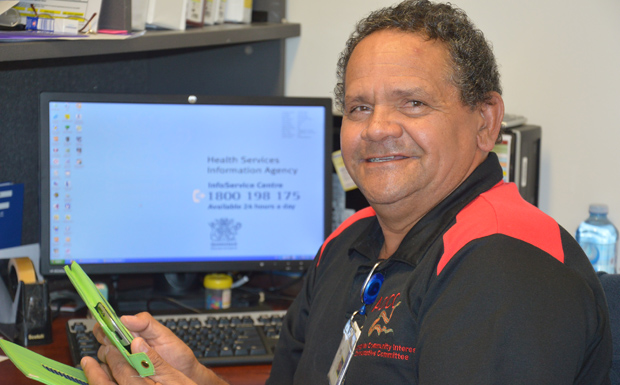
by Marcus Priaulx
Barambah PaCE
Cecil “Pickle” Brown has loved every job he’s had.
“I’ve always given 100 per cent,” the acting Cherbourg Community Health manager said.
Today he’s best known as “Uncle Pickle” to the kids from 30 schools across the South Burnett he’s helped rescue from Otitis Media ear infections.
“Whenever I go into the schools that’s what I hear; ‘hello Uncle Pickle’,” the man who runs the Health-e-Piccaninnies van said.
Pickle started life on the Cherbourg Mission.
He remembers standing with kids at the old community hall each Christmas and getting an ice-block and present from a white government officer dressed as Santa.
Pickle’s father Cecil worked as a cabinet maker and farmhand and travelled to Brisbane to box professionally at Festival Hall.
His mother Rae had nine children and worked as a domestic at Cherbourg Hospital, until the family moved 31km to Kinbombi’s farming district.
Pickle and five of his siblings then faced the daunting task of going to Goomeri’s Year 1- 10 school.
“We were the only black faces there,” Pickle said.
But he and his two school-aged brothers and three sisters fitted in well and Pickle secured a job at a bakery within minutes of his last day at school in Year 10.
“At the sound of the bell I walked straight up there and set to work,” he said.
“My father had spoken to the owner and had set it up for me.”
But after 11 months as a baker’s hand, Pickle was about to begin his apprenticeship when he heard townsfolk “didn’t like a blackfella making their bread”.
As a 16-year-old, Pickle was hurt.
Despite the urging of his boss to stay, Pickle went to live with his older brother and sisters in Brisbane.
He worked in a meatworks, steel foundry and for Schwarzkopf Hair Products.
“I had big frizzy hair then and they had the best products out there,” Pickle joked. “I put them to use.”
But when Pickle returned to Cherbourg to holiday with his elderly grandmother, Elsie McGowan, he decided to stay.
He worked at the Gallangowan Foresty for 13 years before being asked to start an emu farm by Cherbourg council CEO Warren Collins.
The industry was proving successful in Western Australia and riding off the back of demand for ostrich products.
Pickle was given 14 employees and a National Parks wildlife permit to capture 300 emu chicks.
That was easier said than done. As the songs says, emus can “run the pants off a kangaroo”.
So he and his men sat down to work out what to do.
“We decided to separate the old boy looking after the chicks with a motorbike and herded the chicks towards the fences,” Pickle said.
His men then grabbed the small birds by the legs and put them in cages.
“Six of us were A Grade footballers at the time and used it for training,” Pickle said.
“It was bloody hard work.”
After four trips to Tambo and Blackall the men had their allotted amount.
For 13 years they built the Cherbourg Emu Farm to hold 5000 birds, ranging from chicks to adults.
They sold stock to other farms. An abattoir was built to provide emu meat, leather, oil, feathers and eggs to a European market.
Then bird flu hit NSW and all exports were stopped.
The domestic market was too small to support the emu industry and Australian stakeholders began to fight among themselves.
Pickle looked to the future.
He realised he wasn’t getting younger at 44 so he decided to find work that would see him through to retirement and provide good superannuation.
He found a job with Community Health and has continued to work and study.
Pickle now holds a Diploma in Primary Health Science, is in a senior role and provides a service that helps people lead a happy life.
He feels very satisfied, content and happy.
“For Cherbourg kids I’d say: ‘Go to school every day, keep going, do your Year 11 and 12; even university’,” he said.
“Learning gives you the scope for better wages and makes it more enjoyable for your job because you can operate better and utilise equipment.
“You get better results; more satisfaction.
“You build your confidence once you master techniques.”
Pickle now looks back and is thankful to his parents for making him and his brothers and sisters go to school every day, respect their elders and respect their family.
“They taught us to treat people as we’d want to be treated and that school sets you up for your future,” he said.























